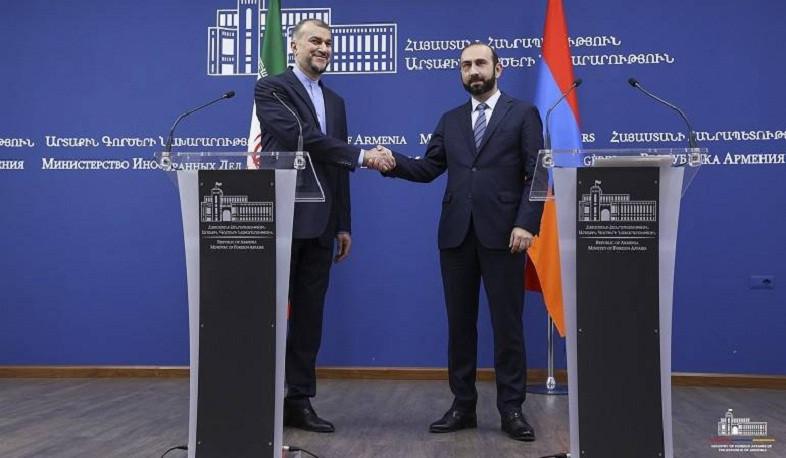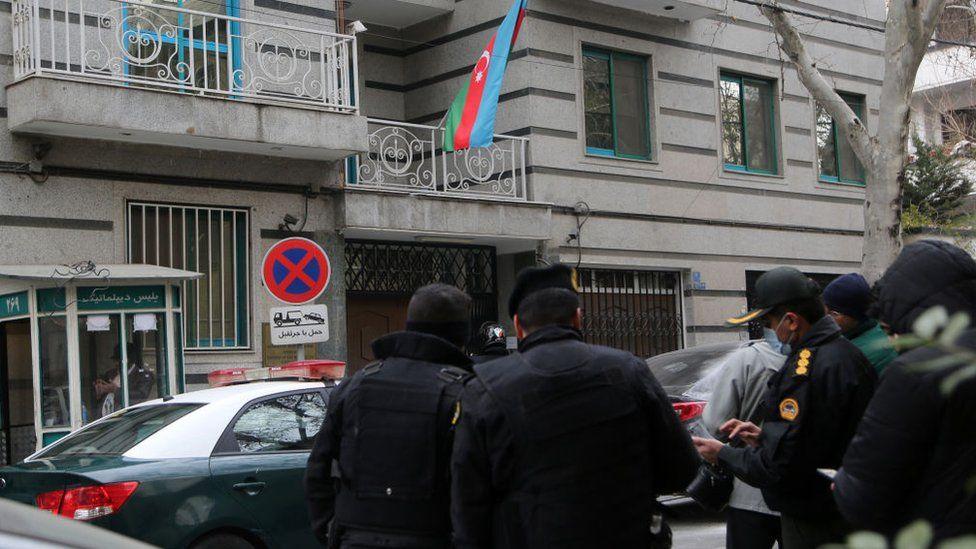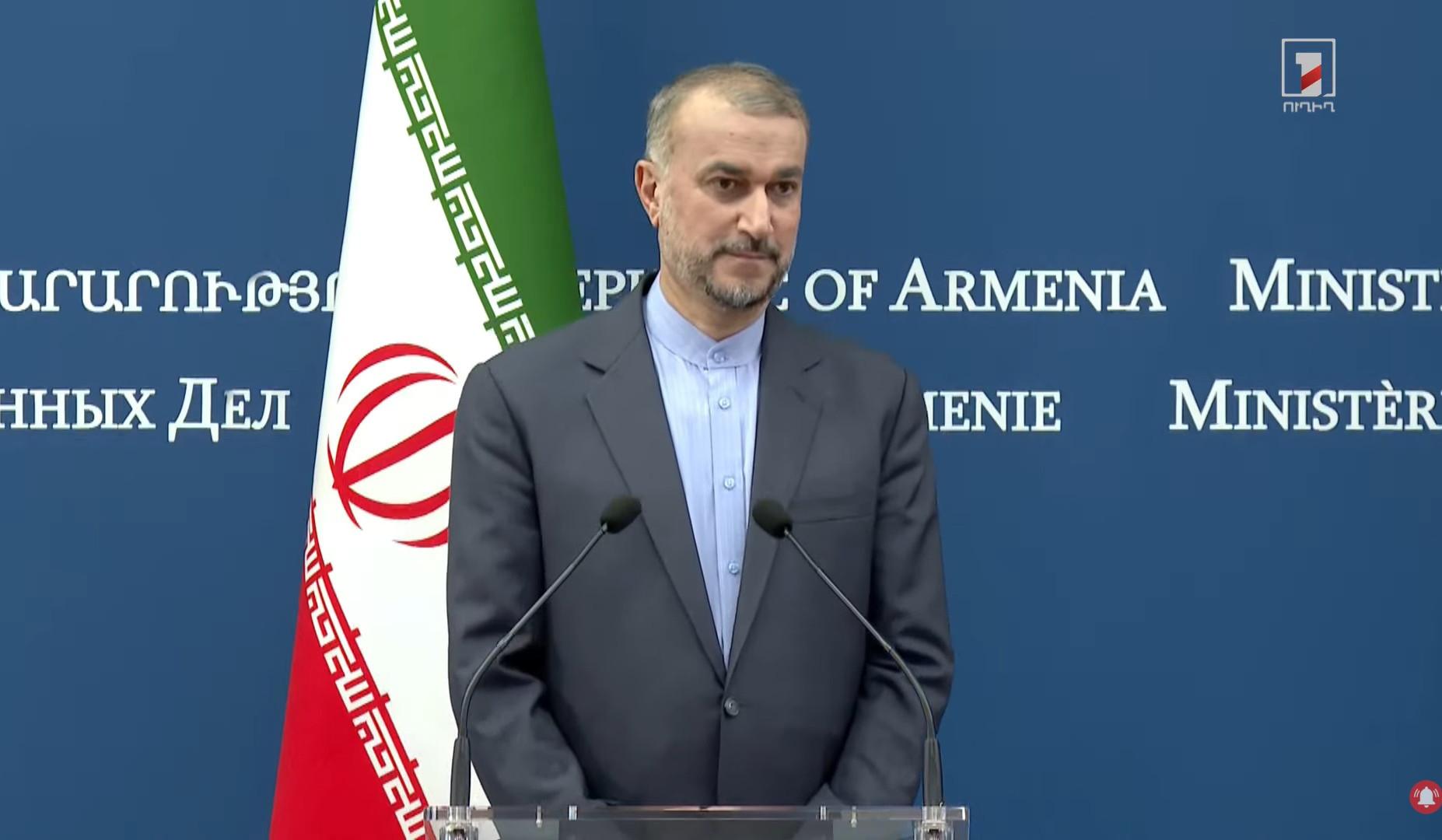Iran's relentless focus on South Caucasus How genuine Tehran is in regional peace search efforts
With 2024 around the corner, the South Caucasus has seen momentous events throughout 2023, ranging from ending Armenia’s 30-year-long occupation to the full restoration of Azerbaijan’s sovereignty, to the first joint statement of the arch-enemies - Baku and Yerevan - on the swap of military prisoners, to mention but a few.
Iran driving a wedge or conducive to peace efforts?
Iran’s Foreign Minister Hossein Amir-Abdollahian paid a one-day visit to Armenia on 27 December. Prior to the Yerevan visit, he had a phone conversation with Azerbaijan’s Jeyhun Bayramov and Russia’s Sergei Lavrov to review issues of regional vitality and fundamental changes in Yerevan’s orientation to the West. When in Yerevan, Iran’s top diplomat underscored Tehran's support for a lasting peace deal between Azerbaijan and Armenia, accentuating the need for a peace accord without any "interference" by foreign powers.
In keeping with a report by the Iranian Foreign Ministry, Amir-Abdollahian warned Armenian Prime Minister Nikol Pashinyan against the "entry of extra-regional actors" in the Caucasus, alleging it would "further complicate the situation" in the region.
"Peace, security, and stability in Armenia are among the priorities of the Islamic Republic of Iran. We strongly believe that attaining an enduring peace in the South Caucasus region, free from foreign interference and with the aid of regional guarantors, would be highly advantageous for all parties involved," he noted.

Hossein Amir-Abdollahian’s unscheduled visit to Armenia came hot on the heels of Prime Minister Nikol Pashinyan's visit to Russia, where, some pundits believe, a deal was struck over the Zangazur Corridor. Iran's stiff opposition to the Zangazur Corridor altered the calculations of the regional actors with Baku reassessing the situation to declare that the Zangazur Corridor is no longer a priority for Azerbaijan.
Within the context of the Armenian prime minister's unexpected visit to Moscow and the talks indicated changes in a direction that is not at all in Iran's favour. In Moscow, in the face of serious pressure from Russia, Armenia is believed to finally agreed to the opening of the Zangazur Corridor, though no confirmation as of now.
Under such circumstances, Iran would eventually boost pressure on Armenia to thwart the opening of the corridor. Abdollahian's unscheduled visit to Yerevan, some believe, may be aimed at getting first-hand information about the Moscow negotiations and continuing its pressure vis-à-vis the Zangazur Corridor.
Iran’s top diplomat also hailed recent deals Baku and Yerevan hammered out, expressing support for the "opening of historical communication lines based on mutual interests and sovereignty". Abdollahian was referring to the proposed Zangazur Corridor, which aims to link Azerbaijan with its exclave Nakhchivan via the Zangazur, which Tehran believes will sever its land link with Armenia. The latter said it is ready to restore an old railway line there, but it should remain under its control.
Yerevan has recently boosted ties with Western countries, including reaching an arms deal with France, amid its deteriorating ties with Russia especially following Azerbaijan's full takeover of its breakaway Karabakh region in September. On December 27, Amir-Abdollahian also held a presser with Mirzoyan, where he again called for peace in the South Caucasus "free from foreign interference" and referred to Iran, Russia, and Turkey as "regional guarantors". His remark has nothing to do with Azerbaijan but too much to do with Armenia both expressly or implicitly. Iran is against the West’s involvement in whatever happens in the South Caucasus.
In another move that will anger Azerbaijanis is Iran’s consent to the opening of the Armenian consulate in Tabriz, a city populated by ethnic Azerbaijanis. If opened, it will become the third consulate in the city along with Azerbaijani and Turkish missions. Speaking at a joint news conference, Mirzoyan lauded Iran’s support for Armenia’s territorial integrity and sovereignty. On the peace talks with Baku, Mirzoyan said there was "a window of real opportunities for peace with Azerbaijan" and reaffirmed Armenia’s readiness to continue negotiations with Azerbaijan to normalize ties between the two states. Mirzoyan added that Yerevan and Baku are still to agree on maps to start the delimitation of their borders.
"We are now mulling the issue of including specific maps in the peace deal to make the delimitation process predictable," he said. For his part, Amir-Abdollahian voiced Iran’s readiness to become an active factor and be conducive to achieving regional peace and stability.
A watershed moment in Azerbaijani-Iranian relations
With a month to go to the first tragic anniversary of January 27, 2023, armed attack at the Azerbaijani embassy in Tehran, which claimed one security officer dead and two injured, Baku’s diplomatic mission remains closed and the ties are lukewarm despite a series of meetings at various levels.

Tehran’s desire to play an active role in a possible peace deal between Baku and Yerevan has always been taken with a pinch of salt, skepticism, and distrust, and Abdollahian’s statement in Yerevan that Tehran backs a solution to the conflict between Azerbaijan and Armenia without a third actor involvement, that is, the collective West, is always viewed with doubt and strive for gaining upper hand in the region, and this is veracious as the relations between Iran, Armenia, and Azerbaijan are complex and influenced by historical, geopolitical, ethnic, and economic factors.
Iran’s geopolitical considerations
Iran shares historical and cultural ties and borders with both Armenia and Azerbaijan due to its geographical proximity and there is a significant Azerbaijani minority in Iran, particularly in the northwestern region of the country, centered around Tabriz.
Armenia, despite being a predominantly Christian nation, has maintained historical ties with Iran, fostering cultural and economic exchanges. Iran is strategically located in the region, and stability in its neighboring countries is crucial for its own security and economic interests.
The Azerbaijani minority in Iran is an essential factor. Iran has a delicate balance to maintain between supporting its Azerbaijani population and not alienating its relations with Armenia. Iran seeks economic cooperation with both Armenia and Azerbaijan. The expected opening of the Armenian consulate in Tabriz is an example of diplomatic efforts to enhance economic and cultural ties, despite the presence of a significant Azerbaijani population in the region. Tehran is also motivated by a desire for regional stability. The involvement of external actors, particularly Western powers, may introduce geopolitical complications that Iran seeks to avoid.
Tehran's preference for a solution without third-party involvement, especially from the West or the USA, is rooted in its desire to maintain control over regional affairs and limit external influence in its immediate vicinity. The theocratic Iran faces the challenge of balancing its relationships with Armenia and Azerbaijan carefully. By supporting a peace deal without external actors, Iran aims to position itself as a regional mediator while safeguarding its interests and relationships with both countries.

In conclusion, Iran's interest in playing an active role in the peace process between Azerbaijan and Armenia is multifaceted. It involves a delicate balancing act between historical ties, ethnic considerations, economic interests, and a desire for regional stability. Tehran's preference for a solution without external actors reflects its cautious approach to maintaining control over the resolution process and avoiding potential complications from outside influences.
Sandwiched between Turkey and Azerbaijan, Armenia has seen Iran with which it constructed reliable relations, as a potential counterweight to Azerbaijan. Simultaneously, Moscow tried hard to enhance Armenia’s dependence on Russia, making it more difficult for Yerevan to develop closer economic and energy ties with Tehran.








